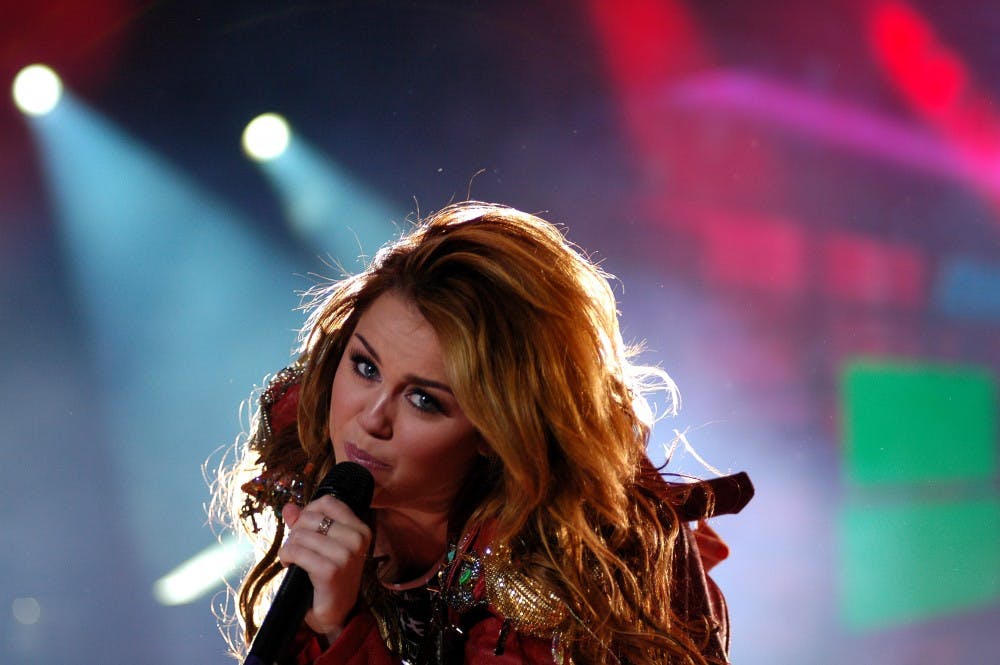Grill–wearing Bangerz Miley Cyrus was obscenely ridiculous—no one will ever forget the iconic image of Miley, clad only in a pair of maroon Doc Martens, swinging into the frame on her wrecking ball. Dead Petz Miley was a drug–fueled psychedelic head–case—her “Do It” music video was a hot mess of glitter, slime, and milk.
Younger Now Miley, on the other hand, is tired. The album is dominated by half–hearted, starry–eyed ballads, all of which lack the spunk and attitude that defined the majority of Miley’s previous albums. Though Miley’s sultry voice saves the album from being a total flop, it can’t quite overcome her bland and ultimately cliché lyrics. In “Rainbowland,” for instance, Miley sings, “Living in a Rainbowland / Where everything goes as planned / And I smile / ‘Cause I know, if we try, we could really make a difference in this world.”
As its name suggests, Younger Now, feels, well, younger. But this is a retroactive kind of youth: youth for youth’s sake, nostalgic and backwards–looking, naive without any sort of aged perspective. In the album’s title track, Miley opens by singing “No one stays the same / You know what goes up must come down / Change is a thing you can count on / I feel so much younger now.” She earnestly tries to frame this album within the context of a full circle narrative, hoping to find freshness in this revival. Instead, the album feels stale, overdone at best.
Perhaps most noticeable about the album is its distinct sound. Younger Now is a sonic departure from Miley’s past work—the album trades out highly remixed baselines for easygoing hi–hat and cymbals combos; hot and heavy synth for mellow guitar refrains. Miley’s voice bursts through her predictable lyrics as natural and untouched, adding a spark to her flat content. We can understand Younger Now as a reclamation of Miley’s southern roots. The cover, for instance, showcases Miley dressed in leather, sporting a 50’s style pompadour, recalling rock and roll legend, Elvis Presley. Likewise, “Rainbowland” features her godmother and country queen, Dolly Parton.
Though Younger Now by no means reinvents the wheel, a few tunes do stand out. “Bad Mood,” for instance, sulks and slinks its way into your ears. Miley’s ghostly refrain of “I wake up in a bad mood,” recalls some of the star’s beloved spunk and shows a more serrated side to the love that inspired shiny, bubbly tunes “Rainbowland” and “I Would Die for You.” She sings “I’m sick of rushing straight to the sink / You’re acting like you ain’t got the news / I don’t even really care what you think.” Old Miley—wild, rebellious, and edgy—shines through here. This is Miley at her rawest, her most unfiltered.
“Love Someone” likewise evolves the persistent rhythm and capricious melody of “Bad Mood.” The song opens with a snappy guitar riff that sounds as if it would be right at home on a Rolling Stones record. Miley here is brooding, dangerous, and above all, captivating. Her gravelly melisma adds some much needed grit to this “unicorns and rainbows” album.
Miley makes definite stylistic progress on this album. At moments, we catch a glimpse of what she could be—cerebral like Joni Mitchell, folksy like Fleetwood Mac, even powerful like Nina Simone. But more than anything, Younger Now is a half–way point: Miley still has a lot of growing and developing to do.

